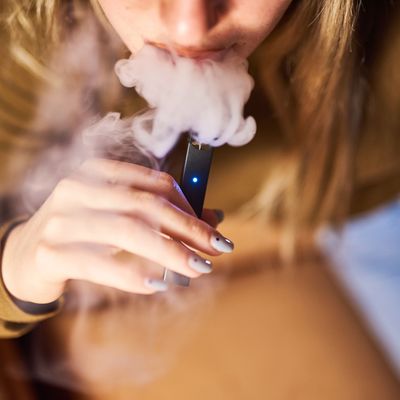
On Thursday, the FDA announced a ban on Juul products, denying the company’s application to sell e-cigarettes in the United States and ordering Juul to immediately stop selling and distributing its products. In other words: It just got a lot harder to live that vape life.
The decision comes after a two-year investigation into the e-cigarette industry. “The agency has dedicated significant resources to review products from the companies that account for most of the U.S. market,” FDA commissioner Dr. Robert M. Califf said in a statement. “We recognize these make up a significant part of the available products and many have played a disproportionate role in the rise of youth vaping.” According to the FDA’s official announcement, Juul’s application “lacked sufficient evidence regarding the toxicological profile of the products” and included studies with “insufficient and conflicting data — including regarding genotoxicity and potentially harmful chemicals leaching from the company’s proprietary e-liquid pods.”
Juul has been in a battle with regulators for years. The company established dominance of the e-cigarette market in 2018, when it reportedly represented 75 percent of the tobacco-vaping industry, per a Wells Fargo analysis of Nielsen data. At the time, regulators and anti-tobacco lobbyists started to become especially concerned with Juul’s availability to minors and the rise in adolescent vaping. Specifically, Juul came under attack for its use of young models, which critics viewed as intentionally courting a younger customer base, and flavored cartridges like mango and cucumber. In an effort to curb criticism, Juul took flavored cartridges off the market in 2019, leaving only menthol and tobacco flavors. The company also shuttered its Instagram and Twitter accounts so as not to be seen as advertising to minors.
The health impacts of e-cigarettes have also come under increased scrutiny in the past five years. Scientific studies began examining whether vaping could cause lung cancer as horror stories started spreading. And hundreds of lawsuits alleged that Juul’s marketing was specifically tied to a rise in nicotine addictions, despite the company advertising Juul as a “healthier” alternative to smoking traditional cigarettes. The company denied these claims, but in 2021 settled a case with North Carolina, which accused Juul of using advertising to cause a rise in nicotine addiction among young people, agreeing to pay $40 million. Similar cases are still pending.
Juul reportedly plans on appealing the FDA’s decision.





